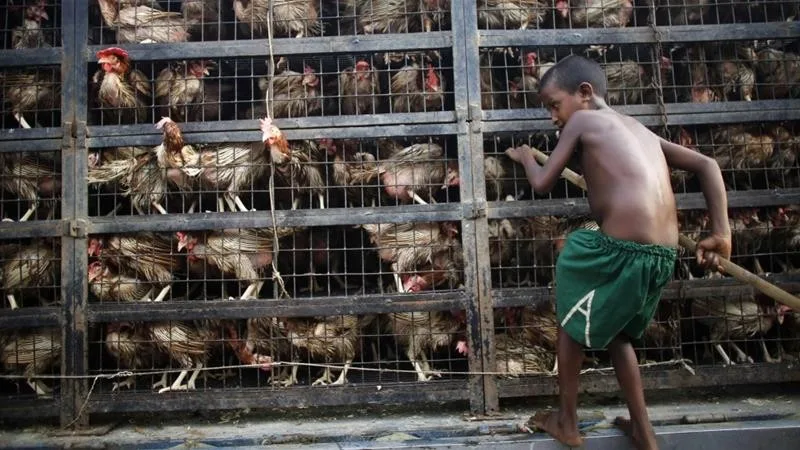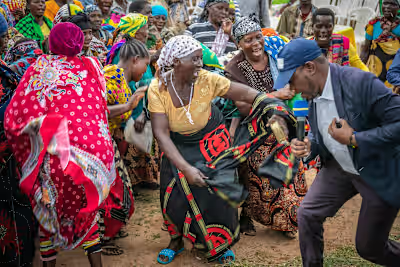One Health Day Reflections: Strengthening Global Health Securit…

In today's interconnected world, the need to develop public health infrastructure and preparedness has never been more critical. As global health threats persist and new ones emerge, it is imperative to adopt a comprehensive One Health approach. On One Health Day, I am taking time to reflect on where DAI and all of my incredible colleagues have made concerted efforts to enhance global health security and build health system resilience. I celebrate everyone today who is working hard to bring a whole-of-society approach to health security response.
Public Health Infrastructure
The foundation of effective public health lies in robust governance structures, a skilled workforce, and seamless access to essential resources. These elements empower public health laboratories and infectious disease units, allowing them to function optimally.
In response to the escalating threat of antimicrobial resistance, the Fleming Fund has undertaken significant efforts across numerous low- and middle-income countries. As a leading partner, DAI has played a pivotal role in establishing One Health governance systems, optimizing data integration, utilization and surveillance systems, while enhancing laboratory capacities and connectedness, including National Reference Laboratories and genomic sequencing capabilities. This collaborative effort has substantially improved antimicrobial resistance detection, surveillance and response. DAI's implementation of country grants has breathed new life into the fight against AMR in Bangladesh, Indonesia, Nigeria, and Pakistan. To date, DAI has revamped 48 laboratories and contributed to the development of over 25 policies and guidelines...and those numbers keep increasing. In 2022, our DAI Pakistan team won the global antimicrobial stewardship prize from the AMR Industry Alliance for bringing antimicrobial resistance (AMR) awareness to the forefront of clinical care. So much to be proud of.
Localized Empowerment
Local communities are often the first to witness and be affected by health threats, including zoonotic diseases, environmental hazards, and public health emergencies. Empowering communities enhances their ability to rapidly detect and respond to these threats, enhance community resilience, support data-driven decision-making, and foster active participation in health-related activities. Communities contribute to a more comprehensive and effective approach to addressing the interconnected health challenges facing our world.
Communities are a key partner for local government, and developing capacity as well as trust was the backbone of our UK FCDO funded Tackling Deadly Diseases in Africa (TDDA) program. Across our five host countries - Côte d'Ivoire, Chad, Cameroon, Mali and Uganda - we built the capacities of over 200 staff from more than 110 CSOs. TDDA’s CSO capacity-building toolkit includes training modules, agendas, facilitator guides, presentation templates and other resources (in English and French). Their participation is already helping to ensure health security interventions represent and serve the needs of even the most vulnerable and most marginalized people in society, as seen in this documentary "Our Common Ground" on our efforts in Chad.
As part of DAI's commitment to USAID/South Sudan, Policy LINK has taken the lead in conducting institutional and community resilience mapping exercises in the Resilience Focus Zone in South Sudan. These exercises gathered stakeholder perspectives on community systems, institutions, capacities, and structures for community-led resilience. Drawing on the insights from these activities, Policy LINK engaged local communities in sense-making workshops and local action planning, promoting evidence-based decision-making and empowering local communities. In line with these efforts, Policy LINK in South Sudan has created resource guides titled "A Resource Guide for Building Community-Led Resilience: Lessons from South Sudan" to foster wider learning and knowledge management.
Health Security Strategy Development and Budgeting
Governments must develop comprehensive national health security plans, action plans, and associated budgets to address public health threats effectively. These strategies are indispensable for coordinated and efficient responses during health emergencies. Amid the COVID-19 pandemic, TDDA provided emergency training for over 600 community-based medical staff in Côte d'Ivoire through the Ministry of Health and Public Hygiene, with technical and financial support. The training focused on Abidjan, a city significantly impacted by the pandemic. TDDA also played a crucial role in Uganda by enhancing the skills of border officials to prevent disease spread. Additionally, through Fleming Fund, DAI is working closely with national and provincial governments to support the implementation of National Action Plans for Antimicrobial Resistance (AMR). Their investment aims to develop and strengthen public sector laboratories and surveillance systems.
Pandemic Preparedness and Emergency Management
With the looming threats of antimicrobial resistance, emerging diseases, and zoonotic pathogens, comprehensive preparedness for pandemics and public health emergencies is non-negotiable. This preparedness involves the development of strategies, equipping healthcare professionals, and strengthening emergency management systems.
Recommended by LinkedIn
The USAID Preparedness and Response activity, implemented by DAI, has been instrumental in supporting 16 countries across Africa and Southeast Asia, fortifying their national One Health platforms and developing the One Health University Networks (OHUNs). Improved government coordination, upgraded public health systems, refined policies, and private sector engagement have made these countries more resilient to emerging diseases.
Through the USAID-ASEAN Partnership for Regional Optimization within the Political-Security and Socio-Cultural Communities (PROSPECT), DAI has pioneered a regional emergency management coordination system within the Association of Southeast Asian Nations (ASEAN). This has led to the establishment of the ASEAN Public Health Emergency Coordination System (APHECS), which will be integrated within the operationalization of the ASEAN Center for Public Health Emergencies and Emerging Diseases (ACPHEED). The commitment to a One Health approach and the focus on enhancing preparedness for public health emergencies have driven the harmonization of coordination mechanisms in ASEAN.
Policy Development
Developing effective policies necessitates a solid foundation of reliable data, effective communication, and the right expertise. Transforming surveillance data and scientific research into customized policy recommendations, along with conducting political economy analyses, is pivotal for informed decision-making.
The PROSPECT initiative has taken up the challenge of developing a strategy for ASEAN to strengthen capabilities and integrate a One Health approach to prevent the spread of zoonotic diseases arising from wildlife trade. Wildlife trading practices, whether legal or illegal, serve as mechanisms for the spread of zoonotic diseases.
The TDDA initiative has worked alongside governments to designate official Points of Entry (PoEs) to enhance adherence to the International Health Regulations (IHR). This effort has not only fostered support for PoE capacity building but also prioritized it, crucial for the prevention, detection, and response to human and animal health events. TDDA collaborated with governments to assess PoEs' capacity and developed national guidelines, protocols, and training manuals to enhance PoE performance. For Cameroon, sharing borders with Chad, Central African Republic, the Republic of the Congo, Nigeria, Equatorial Guinea and Gabon, so training of border officials on standardized procedures and cross-border collaboration are vital to protect the health of Cameroonians and neighbouring populations alike.
Institutionalizing One Health
The One Health approach, characterized by collaboration between national health, animal, and environmental ministries, is fundamental for developing holistic public health strategies. Building robust multisectoral coalitions and partnerships promotes better information sharing and collaborative action.
The USAID Preparedness and Response activity has been instrumental in supporting eight One Health platforms to identify the most critical endemic and emerging zoonotic diseases of public health concern. Local professionals were trained to use the CDC's National One Health Zoonotic Disease Prioritization Tool, which employs a participatory and transparent process to develop prioritization criteria and rank zoonoses against those criteria. These activities facilitated consensus on priority disease lists, bringing together the human, animal, and environmental health sectors to optimize resources and develop multisectoral interventions to prevent and mitigate outbreaks. DAI produced a set of several One Health toolkits to guide multisectoral coordination.
In line with this holistic approach, the Fleming Fund portfolio is actively building laboratory capacity to collect antimicrobial use data using a One Health approach. DAI conducts training to strengthen laboratory capacities in 64 laboratories across all four DAI Fleming countries. This comprehensive approach not only enhances local surveillance but also facilitates the assessment of current M&E tracking systems.
Our Initiatives Are Making a Difference
As we celebrate One Health Day, it's evident that DAI's initiatives are contributing significantly to global health security. Through comprehensive One Health approaches and international cooperation, DAI is actively shaping a safer and more resilient future for us all. Thank you, colleagues and partners!
Like this project
Posted Apr 10, 2025
In today's interconnected world, the need to develop public health infrastructure and preparedness has never been more critical. As global health threats persi…
Likes
0
Views
2




